Service Alert
July 1 - Canada Day
CELA will be closed on Tuesday, July 1st for Canada Day. Our office will reopen and our Contact Centre services will resume on Wednesday, July 2nd. Enjoy your holiday!
CELA will be closed on Tuesday, July 1st for Canada Day. Our office will reopen and our Contact Centre services will resume on Wednesday, July 2nd. Enjoy your holiday!
Showing 1 - 20 of 999 items
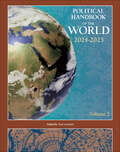
By Tom Lansford. 2025
The Political Handbook of the World 2024–2025 is the most authoritative and comprehensive reference guide available for understanding the political…
landscape of every nation and territory across the globe. This updated edition features more than 200 entries, offering detailed coverage of governmental structures, political parties, and current leadership. Known for its unmatched depth, the volume provides in-depth analysis of both major and minor political parties and movements, and delivers timely insights into recent controversies, political crises, and key events from the past two years. This edition also includes up-to-date listings of ambassadors, international organization memberships, and expanded profiles of over 30 intergovernmental organizations and UN agencies. Trusted by researchers, analysts, journalists, and students, this resource continues to deliver essential, reliable political data and analysis.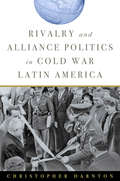
By Christopher Darnton. 2014
The success or failure of foreign policy initiatives in Latin America is heavily influenced by bureaucratic and military background players.Rivalry…
and Alliance Politics in Cold War Latin America, Christopher Darnton’s comparative study of the nature of conflict between Latin American states during the Cold War, provides a counterintuitive and shrewd explanation of why diplomacy does or doesn’t work. Specifically, he develops a theory that shows how the “parochial interests” of state bureaucracies can overwhelm national leaders’ foreign policy initiatives and complicate regional alliances.His thorough evaluation of several twentieth-century Latin American conflicts covers the gamut of diplomatic disputes from border clashes to economic provocations to regional power struggles. Darnton examines the domestic political and economic conditions that contribute either to rivalry (continued conflict) or rapprochement (diplomatic reconciliation) while assessing the impact of U.S. foreign policy.Detailed case studies provide not only a robust test of the theory but also a fascinating tour of Latin American history and Cold War politics, including a multilayered examination of Argentine-Brazilian strategic competition and presidential summits over four decades; three rivalries in Central America following Cuba’s 1959 revolution; and how the 1980s debt crisis entangled the diplomatic affairs of several Andean countries. These questions about international rivalry and rapprochement are of particular interest to security studies and international relations scholars, as they seek to understand what defuses regional conflicts, creates stronger incentives for improving diplomatic ties between states, and builds effective alliances. The analysis also bears fruit for contemporary studies of counterterrorism in its critique of parallels between the Cold War and the Global War on Terror, its examination of failed rapprochement efforts between Algeria and Morocco, and its assessment of obstacles to U.S. coalition-building efforts.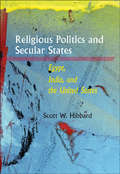
By Scott W. Hibbard. 2011
2011 Winner of the Charles H. Levine Memorial Book Prize of the International Political Science AssociationThis comparative analysis probes why…
conservative renderings of religious tradition in the United States, India, and Egypt remain so influential in the politics of these three ostensibly secular societies. The United States, Egypt, and India were quintessential models of secular modernity in the 1950s and 1960s. By the 1980s and 1990s, conservative Islamists challenged the Egyptian government, India witnessed a surge in Hindu nationalism, and the Christian right in the United States rose to dominate the Republican Party and large swaths of the public discourse. Using a nuanced theoretical framework that emphasizes the interaction of religion and politics, Scott W. Hibbard argues that three interrelated issues led to this state of affairs. First, as an essential part of the construction of collective identities, religion serves as a basis for social solidarity and political mobilization. Second, in providing a moral framework, religion's traditional elements make it relevant to modern political life. Third, and most significant, in manipulating religion for political gain, political elites undermined the secular consensus of the modern state that had been in place since the end of World War II. Together, these factors sparked a new era of right-wing religious populism in the three nations.Although much has been written about the resurgence of religious politics, scholars have paid less attention to the role of state actors in promoting new visions of religion and society. Religious Politics and Secular States fills this gap by situating this trend within long-standing debates over the proper role of religion in public life.
By Michael Grunwald. 2025
From the author of New York Times bestseller The New New Deal, a groundbreaking piece of reportage from the trenches…
of the next climate war: the fight to fix our food system.Humanity has cleared a land mass the size of Asia plus Europe to grow food, and our food system generates a third of our carbon emissions. By 2050, we&’re going to need a lot more calories to fill nearly 10 billion bellies, but we can&’t feed the world without frying it if we keep tearing down an acre of rainforest every six seconds. We are eating the earth, and the greatest challenge facing our species will be to slow our relentless expansion of farmland into nature. Even if we quit fossil fuels, we&’ll keep hurtling towards climate chaos if we don&’t solve our food and land problems. In this rollicking, shocking narrative, Grunwald shows how the world, after decades of ignoring the climate problem at the center of our plates, has pivoted to making it worse, embracing solutions that sound sustainable but could make it even harder to grow more food with less land. But he also tells the stories of the dynamic scientists and entrepreneurs pursuing real solutions, from a jungle-tough miracle crop called pongamia to genetically-edited cattle embryos, from Impossible Whoppers to a non-polluting pesticide that uses the technology behind the COVID vaccines to constipate beetles to death. It&’s an often infuriating saga of lobbyists, politicians, and even the scientific establishment making terrible choices for humanity, but it&’s also a hopeful account of the people figuring out what needs to be done—and trying to do it. Michael Grunwald, bestselling author of The Swamp and The New New Deal, builds his narrative around a brilliant, relentless, unforgettable food and land expert named Tim Searchinger. He chronicles Searchinger&’s uphill battles against bad science and bad politics, both driven by the overwhelming influence of agricultural interests. And he illuminates a path that could save our planetary home for ourselves and future generations—through better policy, technology, and behavior, as well as a new land ethic recognizing that every acre matters.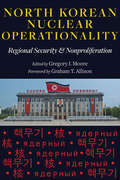
By Gregory J. Moore. 2014
What are the consequences of a successful nuclear program in North Korea?Despite near-universal opposition to North Korea's moves to acquire…
nuclear weapons, Pyongyang is determined to succeed. It is only a matter of time before the North Koreans are able to combine their extant nuclear weapons capabilities with a viable delivery system. The threat multiplies in light of the North Koreans having already demonstrated the willingness and ability to sell nuclear technology, materials, and know-how to other nuclear aspirants. In North Korean Nuclear Operationality, Gregory J. Moore asks leading experts in Asian and security studies to consider the international consequences of a North Korea with operational nuclear weapons.How will South Korea, China, Japan, and Russia react, and does it mean an arms race in the region is inevitable? How should the United States handle the situation, both diplomatically and strategically? North Korea has already destabilized the nuclear nonproliferation regime by being the only country ever to withdraw from the Nuclear Non-Proliferation Treaty and then openly test nuclear weapons. What are the repercussions for the nonproliferation regime of a successful North Korean move to nuclear weapons operationality?Given the importance of these issues and the lack of transparency surrounding North Korean politics, North Korean Nuclear Operationality offers critical and timely insight. A foreword by Graham T. Allison, founding dean of the John F. Kennedy School of Government at Harvard University, sets the stage for a rigorous look at the threats North Korea poses to regional security and the nuclear nonproliferation regime.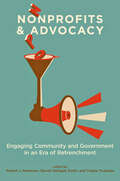
Does nonprofit mean nonpolitical?When the Susan G. Komen foundation pulled funding for Planned Parenthood’s breast exam program, the public uproar…
brought new focus to the high political and economic stakes faced by nonprofit organizations. The missions of 501(c)(3) and 501(c)(4) organizations, political action committees, and now Super PACs have become blurred as issues of advocacy and political influence have become increasingly entangled.Questions abound: Should a nonprofit advocate for its mission and its constituents with a goal of affecting public policy? What are the limits of such advocacy work? Will such efforts fundamentally jeopardize nonprofit work? What can studies of nonprofit advocacy efforts reveal? Editors Robert J. Pekkanen, Steven Rathgeb Smith, and Yutaka Tsujinaka recognize the urgent need for relevant research and insight into these issues as direct and indirect government services are squeezed by federal cutbacks.Nonprofits and Advocacy defines advocacy and clarifies the differences among advocacy, lobbying, political activity, and education, as well as advocacy measurements. Providing original empirical data and innovative theoretical arguments, this comparative study is organized into two parts. The first part focuses on local and national dimensions of nonprofit advocacy, and the second part looks at organizational politics and strategies. The conclusion considers basic questions about nonprofit advocacy and seeks to draw lessons from research efforts and practice.Providing a critical look at the multidimensional roles and advocacy efforts of nonprofits, this volume will be valued by scholars, students, leaders, and activists—many of whom advocate for the interests of their organizations while delivering services to their organizations' constituents. The research is also relevant for policymakers involved in cross-sector public policy initiatives as they strive to provide more efficient public-private solutions to challenging governance issues.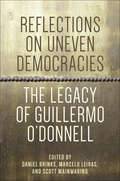
By Daniel Brinks. 2014
A tour-de-force analysis of the current state of democracy studies as seen through the scholarly legacy of Guillermo O’Donnell.Winner of…
the CHOICE Outstanding Academic Title of the Choice ACRLThe third wave of democratization produced a wealth of enduring social science. Beginning in the 1970s, it prompted scholars to develop important theories on authoritarian breakdowns and transitions to democracy. No one in the field was more influential than Guillermo O’Donnell (1936–2011), whose pathbreaking work shaped the scholarship of generations of social scientists. Reflections on Uneven Democracies honors the legacy of O’Donnell’s research by advancing debates related to his work on democracy. Drawing together a veritable Who’s Who of eminent scholars—including two of O’Donnell’s closest collaborators, Philippe Schmitter and Laurence Whitehead—the volume examines issues related to democratic breakdowns and stability, the nature and quality of new democracies, institutional strength, the rule of law, and delegative democracy.This reexamination of some of the most influential arguments about democracy of the past forty years leads to original approaches and insights for a new era of democracy studies. Students of democracy and institutional performance, both Latin Americanists and comparativists more generally, will find this essential reading.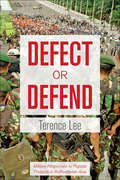
By Terence Lee. 2015
Why do certain militaries brutally suppress popular demonstrations, while others support the path to political liberalization by backing mass social…
movements?Although social movements and media can help destabilize authoritarian governments, not all social protest is effective or culminates in the toppling of dictatorships. Frequently, the military’s response determines the outcome. In Defect or Defend, Terence Lee uses four case studies from Asia to provide insight into the military’s role during the transitional phase of regime change. Lee compares popular uprisings in the Philippines and Indonesia—both of which successfully engaged military support to bring down authoritarian rule—with protest movements in China and Burma which were violently suppressed by military forces. Lee’s theory of “high personalism” and power-sharing among the armed forces leadership provides a framework for understanding the critical transitory phases of democratization. He uses this theory to review and assess Eastern Europe’s democratization events in 1989, the Colored Revolutions of the early 2000s, and the protests and revolutions unfolding in the Middle East. This book will appeal to students and scholars of comparative politics, Asian studies, security studies, and international relations, as well as defense policymakers.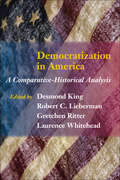
By Desmond King, Robert C. Lieberman, Gretchen Ritter, and Laurence Whitehead. 2009
The essays in this volume examine democracy’s development in the United States, demonstrating how that process has shaped—and continues to…
shape—the American political system.Scholars of American politics commonly describe the political development of the United States as exceptional and distinct from that of other advanced industrial democracies. They point to the United States as the longest-lived and most stable liberal democracy in history. What they often fail to mention, though, is that it took considerable time to extend democracy throughout the country.The contributors to this volume suggest that it is intellectually fruitful to consider the U.S. case in comparison to other countries. They argue that the development of democracy is ongoing in America; that even with a written constitution grounded in liberal democracy, the meaning and significance of U.S. democracy are still evolving. This volume shows that democratization and the pursuit of democracy are processes affected by multiple and continuing challenges—including such issues as citizenship, race, institution building, and political movements—as patterns and practices of politics and governance continue to change.This innovative approach contributes significantly to comparative democratization studies, a field normally confined to Latin America and former communist countries. The U.S. case is a unique reference point for students of American political development and comparative democratization.
By Stéphanie Roza. 2025
THE TRANSFORMATION OF UTOPIA IN THE FRENCH REVOLUTION, FROM A ROMANTIC IDEAL TO A POLITICAL OBJECTIVEUntil the Age of Enlightenment,…
utopia was a popular literary genre, but without concrete political effects. However, in the decades leading up to 1789, its status gradually changed from an entertaining thought experiment to a socialist project. Imagining the ideal city took on the task of articulating revolutionary transformation of society towards equality and social justice.In Utopia, Stéphanie Roza explores the nascent ideal of a community of property and labour, not yet called communism, and the thinkers who engaged with it in the lead-up to the French Revolution. These philosophers included Étienne-Gabriel Morelly, a fierce critic of private property and the mysterious author of the Code de la Nature; the Abbé de Mably, a radical republican and interlocutor of Rousseau; and Gracchus Babeuf, who, from the 1780s onwards, defended the natural right to subsistence and dreamed of a more fraternal world.Together, they laid the foundations for modern socialist movements. In the crucible of the French Revolution, &‘real equality&’ became the goal of a handful of conspirators gathered around Babeuf, who had meanwhile become the &‘tribune of the people&’. The Conspiracy of Equals was considered by Marx to be &‘the first active communist party&’: the hopes and questions that ran through the group prefigured those of the militants of later periods, including today.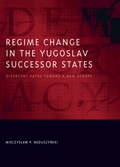
By Mieczysław P. Boduszyński. 2010
In the 1990s, amid political upheaval and civil war, the Socialist Federal Republic of Yugoslavia dissolved into five successor states.…
The subsequent independence of Montenegro and Kosovo brought the total number to seven. Balkan scholar and diplomat to the region Mieczyslaw P. Boduszynski examines four of those states—Croatia, Slovenia, Macedonia, and the Federal Republic of Yugoslavia—and traces their divergent paths toward democracy and Euro-Atlantic integration over the past two decades.Boduszynski argues that regime change in the Yugoslav successor states was powerfully shaped by both internal and external forces: the economic conditions on the eve of independence and transition and the incentives offered by the European Union and other Western actors to encourage economic and political liberalization. He shows how these factors contributed to differing formulations of democracy in each state.The author engages with the vexing problems of creating and sustaining democracy when circumstances are not entirely supportive of the effort. He employs innovative concepts to measure the quality of and prospects for democracy in the Balkan region, arguing that procedural indicators of democratization do not adequately describe the stability of liberalism in post-communist states. This unique perspective on developments in the region provides relevant lessons for regime change in the larger post-communist world. Scholars, practitioners, and policymakers will find the book to be a compelling contribution to the study of comparative politics, democratization, and European integration.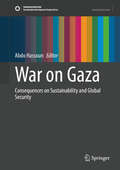
The relentless bombardment and blockade on Gaza have not only drastically restricted the inflow of essential food supplies but have…
also led to a catastrophic humanitarian crisis with unprecedented casualties. The widespread destruction has crippled the ability of the population to grow and process food, leaving Gazans without sufficient access to basic nutrition and pushing them to the brink of famine. Building on the previous work of Dr. Hassoun on acute food insecurity and malnutrition in Gaza, this book addresses not only Sustainable Development Goal (SDG) 2—Zero Hunger, SDG 3—Good Health and Well-being, and SDG 6—Clean Water and Sanitation, but all seventeen SDGs. While brief reports have been published on the topic, this will be the first in-depth scholarly work, offering case studies, data-driven analysis from various fields, and a comprehensive examination of the multidimensional and devastating impacts of war. With an urgent and multidisciplinary perspective, this book highlights the interconnectedness of war, sustainability, and global security, emphasizing how hostilities in Gaza have reversed progress toward achieving all SDGs, both in Gaza and beyond. Bringing together diverse expertise from 60 authors across 27 countries, the book showcases the international and interdisciplinary collaboration underlying its research. Through a series of carefully curated chapters written by specialists in various fields, it provides a comprehensive analysis of how war has affected societal structure, economic resilience, and environmental sustainability in Gaza. For each issue addressed, the text offers strategic insights and practical measures aimed at mitigating damage and fostering resilience. This book serves as a critical resource for policymakers, researchers, humanitarian organizations, and anyone who is interested in understanding and addressing the complex dynamics of conflict and sustainability.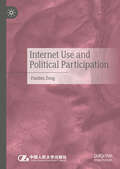
By Fanbin Zeng. 2025
This book explores how Chinese citizens influence both real and internet political participation via using internet. During real political participation…
in selection and collective incident, the influence of internet use is different, which results from different situations of the development of different types of political participation in China. According to the analysis on the political participation in the network public opinion&’s supervision, internet advice, and internet alternative, the author finds that these types of political participation subject to institutional arrangement and effect of real political participation. Therefore, the author proposes that the real political participation effected by the use of internet and internet political participation mutually supply and influence each other, where there is inverse relationship between them. This book will be of interest to researchers, political scientists, and media studies scholars.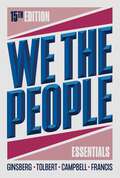
By Benjamin Ginsberg, Theodore J. Lowi, Margaret Weir, Caroline J. Tolbert, Robert J. Spitzer, Megan Ming Francis, Andrea L. Campbell. 2025
The #1 book for American government, helping students engage and participate in politics. Building on We the People’s focus on…
the citizen’s role, why participation matters, and the influence of gender, class, race, and ethnicity in American politics, the Fifteenth Edition offers new ways for students to understand and participate in politics. Chapter-opening stories written by Andrea Campbell, 9 new in the Fifteenth Full Edition, focus on real people from diverse backgrounds and political persuasions and how they have been affected by government and participated in the political process. Author Megan Ming Francis uses her expertise in race and ethnicity politics to add inclusive examples to each chapter, encouraging students of all backgrounds to participate in the course. Content updates throughout the book show students that politics matters, with up-to-date coverage of the 2024 election that highlights pivotal issues and discusses the implications for the future of American politics and government. This purchase offers access to the digital ebook only.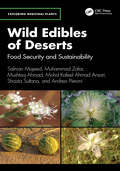
By Mushtaq Ahmad, Muhammad Zafar, Andrea Pieroni, Shazia Sultana, Mohd Kafeel Ansari, Salman Majeed. 2026
Global Wild Edibles of Deserts: Food Security and Sustainability provides coverage of topics in food and health in desert rangelands,…
using an interdisciplinary approach that considers health not only in a functional and human sense, but also in terms of external factors including aridity.The plant diversity in desert ecosystems provide economic service benefits, such as sources of fodder, fuel wood, and traditional medicinal plants. This book documents wild edibles commonly grown in deserts that are hugely beneficial for the herbal industry for the socio-economic uplift of local communities. This book contains multiple field pictorial graphs of desert wild edible plants to help with their identification, and it gives detailed information on food security issues and sustainability measures in the world desert zones. It also focusses on the diversity of wild edibles in deserts across the globe, their nutraceutical importance, production-consumption trends, integration into food menus, and marketing and livelihood opportunities to the indigenous people.A volume in the Exploring Medicinal Plants series, this book creates opportunity for policymakers to develop plans for the successful entry of wild edibles into herbal industries, and attracts farmers owning infertile lands to cultivate wild edibles in desert rangeland. The book is a valuable resource for researchers, conservationists, and policymakers seeking solutions at the intersection of food security and environmental sustainability.
By Curt Lader M.S. Ed., Barron'S Educational Series. 2025
Be prepared for exam day with Barron&’s. Trusted content from AP experts! Barron&’s AP U.S. Government and Politics Premium, Sixteenth…
Edition includes in‑depth content review and online practice. It&’s the only book you&’ll need to be prepared for exam day. Written by Experienced Educators Learn from Barron&’s‑‑all content is written and reviewed by AP experts Build your understanding with comprehensive review tailored to the most recent exam Get a leg up with tips, strategies, and study advice for exam day‑‑it&’s like having a trusted tutor by your side Be Confident on Exam Day Sharpen your test‑taking skills with 6 full‑length practice tests‑‑3 in the book, including a diagnostic test to target your studying, and 3 more online–plus detailed answer explanations and scoring rubrics for all questions Strengthen your knowledge with in‑depth review covering all Units on the AP U.S. Government and Politics Exam Reinforce your learning with multiple-choice and free-response practice questions at the end of each chapter Become familiar with all of the required foundational documents and Supreme Court cases you need to know for test day, all clearly noted throughout the book Online Practice Continue your practice with 3 full‑length practice tests on Barron&’s Online Learning Hub Simulate the exam experience with a timed test option Deepen your understanding with detailed answer explanations and expert advice Gain confidence with scoring to check your learning progress Publisher's Note: Products purchased from 3rd party sellers are not guaranteed by the publisher for quality, authenticity, or access to any online entities included with the product.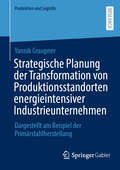
Yannik Graupner untersucht Fragestellungen zur Transformation energieintensiver Industrieunternehmen. Hierzu entwickelt er ein neuartiges Entscheidungsunterstützungswerkzeug zur Bewertung und Gestaltung von Transformationspfaden…
einzelner Produktionsstandorte. Dieses basiert auf einer Investitions- und Kostenrechnung sowie einer Ökobilanzierung, die auf einer aktivitätsanalytischen Modellierung von Produktionsprozessen aufbauen. Zur Gestaltung der Transformation, auch unter Berücksichtigung der Mechanismen des Europäischen Emissionshandels, entwickelt er ein mathematisches Optimierungsmodell. Durch Anwendung des Entscheidungsunterstützungswerkzeugs innerhalb einer Fallstudie aus der Stahlindustrie werden Erkenntnisse hinsichtlich der Auswirkungen alternativer Produktionsverfahren sowie des Einflusses externer Rahmenbedingungen auf die Transformation gewonnen. Auf Basis dessen leitet er Handlungsempfehlungen für die Stahlindustrie und Politik ab.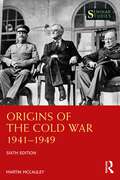
By Martin McCauley. 2026
Now in its sixth edition, Origins of the Cold War 1941–1949 offers a new perspective on the momentous conflict between…
the Soviet Union and the United States, covering the tumultuous years of 1941 to 1949.Adopting an internationalist approach, McCauley builds on the fifth edition by tracing the evolution of the post-imperial world after 1945. Chapters have been updated and expanded to include analyses of countries such as India, Pakistan and Malaya and an exciting discussion of the new Cold War history, which seeks to understand the mistakes and misperceptions of the Western allies. Moreover, this sixth edition offers readers insight into how Stalin ruled, with additional chapters delving into state secrecy and the books in Stalin’s library.Combining the latest scholarship with accessible primary sources, Origins of the Cold War 1941–1949 stands as a valuable introduction to a fascinating period and will be useful to scholars and students of modern global history and international affairs.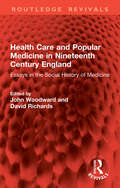
By John Woodward, David Richards. 1977
Originally published in 1977, this book presents a selection of work by historians and sociologists on medicine and society in…
the 19th century. It concentrates on practitioners and patients, quackery and folk medicine, as elements in the social, cultural, political and economic structure of the community at large. The relevance of social history in medicine to the analysis of the role of medicine in society is discussed as well as the knowledge of sex and sexuality and the professionalisation of medicine.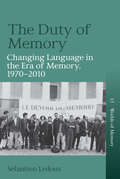
By Sébastien Ledoux. 2025
Within France, the expression “duty of memory” (le devoir de mémoire)speaks to a complex and ever-evolving relationship with the past.…
Emerging in the 1970s, this term raised questions about memorialization which dominated public debates in the 1990s, highlighting France’s entanglements with colonialism and the Holocaust. Drawing on a variety of interviews, archival sources, and data surveys, author Sébastien Ledoux spotlights how the trajectory of this term offers a lens for understanding contemporary societies’ relationship with the past on a global scale.